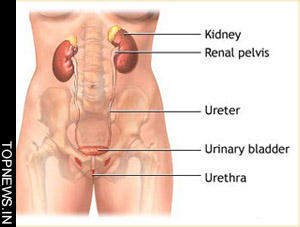Urinary tract infections are easily treatable
 Bad Wildungen, Germany - The most common symptoms of an acute urinary tract infection are a burning sensation during urination, pain in the lower abdomen, and an unusually frequent urge to pass water - with only small amounts passed.
Bad Wildungen, Germany - The most common symptoms of an acute urinary tract infection are a burning sensation during urination, pain in the lower abdomen, and an unusually frequent urge to pass water - with only small amounts passed.
An inflammation confined to the urethra and bladder is not dangerous for an otherwise healthy person. But all cases should be treated to prevent complications.
Inflammations of the urethra and bladder can occur at any age. "Just one in five sufferers is a man," noted Winfried Vahlensieck, a urologist and head physician at the Wildetal Clinic in Bad Wildungen. "The reason is that a woman's urethra is shorter, and so is the distance between its external orifice and the anus."
Consequently, a woman's intestinal bacteria can enter the urinary tract more easily. They are the most frequent causes of urinary tract infections by far. Other causes are viruses, fungi, or bacteria that enter the urinary tract via the bloodstream.
There are several risk factors apart from gender. Some people are genetically predisposed to urinary tract infections. Others have trouble urinating because of a functional disorder or anatomical malformation. Bacteria can multiply easily in urine that remains in the bladder.
"Pregnant women and people with previous conditions are at higher risk of infection and subsequent complications," said Professor Eva Hummers-Pradier, director of Hanover Medical School's Institute of General Medicine. They as well as people with weakened immune systems should always see their family doctor or a urologist immediately if symptoms arise.
In most cases, Hummers-Pradier said, the finding is so unambiguous that no further diagnostic procedures are needed and an antibiotic is prescribed. In less clear-cut cases, or if someone continually gets urinary tract infections, urine is also examined and a urine culture is ordered.
"This precisely detects the pathogen so that therapy can be better targeted," Vahlensieck said.
Simple things often bring relief in addition to prescribed medications. "Most patients find warmth to be pleasant," remarked Christina Prawda, an advisory physician for the Hamburg-based Techniker Krankenkasse, one of Germany's largest public health insurance companies.
"Although their effects haven't been scientifically investigated, there's nothing to be said against a hot water bottle or warm bath."
Antispasmodic agents can also ease discomfort.
In addition, studies have shown that cranberries can guard to a certain degree against frequent infections. "But so far there's no knowledge of what amounts should be taken, and in what form," Vahlensieck said. He recommends drinking two glasses of cranberry juice five days a week, and then taking a two-day break.
Drinking fluids regularly throughout the day - and thereby rinsing out bacteria quickly - helps prevent cystitis. Time spent in the bathroom should always be sufficient to empty the bladder completely.
"Passing water immediately after sexual intercourse quickly eliminates any bacteria that may have been transmitted," Prawda noted. "Females shouldn't make the mistake of practising exaggerated genital hygiene, however," Vahlensieck warned: "Intimate deodorant sprays or too much soap interfere with the body's natural protective mechanisms."
Spermicidal jellies, vaginal suppositories, and use of a diaphragm can also promote infections.
INFO BOX: Men's urinary tract problems are different from women's
Men seldom have urinary tract infections. And they have a lower proportion of smear infections from intestinal bacteria than women do.
"There are increased instances of urogenital malformations among boys under one year of age, and older men often have difficulty urinating because of an enlarged prostate gland," said Winfried Vahlensieck, an urologist based in the German town of Bad Wildungen.
Urinary tract complaints may be due to prostate cancer or phimosis, a condition in which the foreskin cannot be fully retracted from the head of the penis. A thorough urological examination is necessary to determine the cause. (dpa)